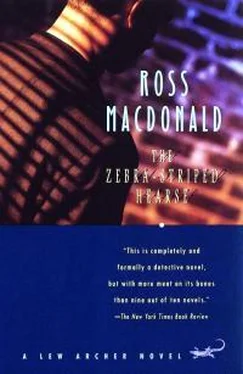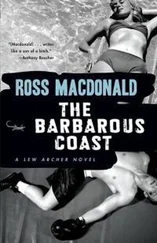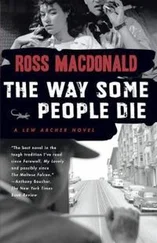“No. Ray told me he found it.”
“Where?”
“On the beach, he said.”
“How long ago was this?”
“About two months. He brought it home and brushed the sand out of it. That’s why I got so frightened, on account of the timing. You said two months. That’s why I lied to you.”
She was leaning on me heavily, one hand on my shoulder, the other clutching my upper arm. I let her lean.
“Ray couldn’t murder anyone,” she said. “He’s a little hard to regiment but he’s not a bad boy really. And he’s so young.”
“He’s not a murder suspect, Mrs. Buzzell. He’s a witness, and the coat is evidence. How he got it may be significant. But I can’t establish that without talking to him. You must have some idea where I can find him.”
“He did say something this morning – something about spending the night at Zuma. I know he took along some things to cook. But what he says and what he actually does are often two different things. I can’t keep track of him any more. He needs a father.”
She was talking into the front of my coat, and her grip had tightened on me. I held her for a bit, because she needed holding, until a car came up the road and flashed its headlights on her wet startled face.
The striped hearse was standing empty among other cars off the highway above Zuma. I parked behind it and went down to the beach to search for its owner. Bonfires were scattered along the shore, like the bivouacs of nomad tribes or nuclear war survivors. The tide was high and the breakers loomed up marbled black and fell white out of oceanic darkness.
Six young people were huddled under blankets around one of the fires. I recognized them: one of the girls was wearing the brown tweed coat. They paid no attention when I approached. I was an apparition from the adult world. If they pretended I wasn’t there, I would probably go away like all the other adults.
“I’m looking for Ray Buzzell.”
One of the boys cupped his hand behind his ear and said: “Hey?”
He was an overgrown seventeen- or eighteen-year-old with heavy masculine features unfocused by any meaning in his eyes. In spite of his peroxided hair, he looked like an Indian in the red firelight.
“Ray Buzzell,” I repeated.
“Never heard of him.” He glanced around at the others. “Anybody ever hear of a Ray Buzzell?”
“I never heard of a Ray Buzzell,” the girl in the coat said. “I knew a man named Heliogabalus Rexford Buzzell. He had a long grey beard and he died some years ago of bubonic plague.”
Everybody laughed except me and the girl. I said to the boy: “You’re Ray, aren’t you?”
“Depends who you are.” He rose in a sudden single movement, shedding his blanket. The three other boys rose, too. “You fuzz?”
“You’re getting warm, kid.”
“Don’t call me kid.”
“What do you want me to call you?”
“Anything but kid.”
“All right, Mr. Buzzell. I have some questions to ask you, about the coat Miss Sutherland is wearing.”
“Who you been talking to? How come you know our names?”
He took a step toward me, his bare feet noiseless in the sand. His little comitatus grouped themselves behind him. They crossed their arms on their chests to emphasize their muscles, and the red firelight flickered on their biceps.
With a little judo I thought I could handle all eight of their biceps, but I didn’t want to hurt them. I was an emissary from the adult camp. I flashed the special-deputy’s badge which I carried as a souvenir of an old trouble on the San Pedro docks.
“I’ve been talking to your mother, among other people. She said you found the coat on the beach.”
“Never believe her,” he said with one eye on the girls. “Never believe a mother.”
“Where did you get it then?”
“I wove it underwater out of sea lettuce. I’m very clever with my hands.” He wiggled his fingers at me.
“I wouldn’t go on playing this for laughs, Buzzell. It’s a serious matter. Have you ever been in Citrus Junction?”
“I guess I passed through.”
“Did you stop over long enough to kill and bury a man?”
“Bury a man?” He was appalled.
“His name was Quincy Ralph Simpson. He was found buried in Citrus Junction last week, with an icepick wound in his heart. Did you know him?”
“I never heard of him, honest. Besides, we’ve had the coat for a couple of months.” His voice had regressed five years, and sounded as though it was changing all over again. He turned to the girl. “Isn’t that right, Mona?”
She nodded. Her sea-lion eyes were wide and scared. With scrabbling fingers she unbuttoned the coat and flung it off. I held out my hands for it. Ray Buzzell picked it up and gave it to me. His movements had lost their certainty.
The coat was heavy, with matted fibers that smelled of the sea. I folded it over my arm.
“Where did you get it, Ray?”
“On the beach, like Moth– like the old lady said. It was salvage, like. I’m always living off the beach, picking up salvage and jetsam. Isn’t that right, Mona?”
She nodded, still without breaking silence.
His voice rushed on in an adolescent spate: “It was soaked through, and there were stones in the pockets, like somebody chunked it in the drink to get rid of it. But there was a strong tide running, and the waves washed it up on the beach. It was still in pretty good condition, this Harris tweed is indestructible, so I decided to dry it out and keep it. It was like salvage. Mona wears it mostly – she’s the one that gets cold.”
She was shivering in her bathing suit now, close by the fire. The other girl draped a plaid shirt over her shoulders. The boys were standing around desultorily, like figures relaxing out of a battle frieze.
“Can you name the beach?”
“I don’t remember. We go to a lot of beaches.”
“I know which one it was,” Mona said. “It was the day we had the six-point-five and I was scared to go out in them and you all said I was chicken. You know,” she said to the others, “that little private beach above Malibu where they have the shrimp joint across the highway.”
“Yeah,” Ray said. “We ate there the other day. Crummy joint.”
“I saw you there the other day,” I said. “Now let’s see if we can pin down the date you found the coat.”
“I don’t see how. That was a long time ago, a couple months.”
The girl rose and touched his arm. “What about the tide tables, Raybuzz?”
“What about them?”
“We had a six-point-five tide that day. We haven’t had many this year. You’ve got the tide tables in the car, haven’t you?”
“I guess so.”
The three of us went up the beach to the zebra-striped hearse. Ray found the dog-eared booklet, and Mona scanned it under the dashboard lights.
“It was May the nineteenth,” she said positively. “It couldn’t have been any other day.”
I thanked her. I thanked them both, but she was the one with the brains. As I drove back toward Los Angeles, I wondered what Mona was doing on the beach. Perhaps if I met her father or her mother I could stop wondering.
THE BLACKWELL HOUSE was dark. I pressed the bell push, and the chimes inside gave out a lonely tinkling. I waited and rang again and waited and rang and waited.
Eventually I heard footsteps inside. The veranda light went on over my head, and the little maid looked out at me sleepily. She was out of uniform and out of sorts.
“What do you want?”
“Are the Blackwells in?”
“She is. He isn’t.”
“Tell her Mr. Archer would like to speak to her.”
“I can’t do that. She’s in bed asleep. I was asleep myself.” She yawned in my face, and hugged her rayon bathrobe more closely around her.
Читать дальше












